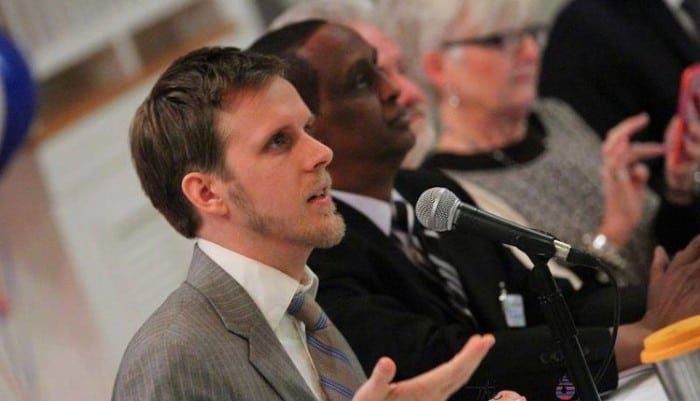Clarkston, Georgia is undeniably a small city, with about 13,000 residents. But it packs a large punch when it comes to envisioning what an inclusive small-town American South could be.
With about 32 percent of its population comprised of recent immigrants or refugees, Clarkston has been nicknamed the “Ellis Island of the South.” Its young mayor, Ted Terry, identifies as a progressive and advertises his pride in his town’s diversity. He is known for a past appearance on Queer Eye. He supports some of the most popular policies of the progressive movement, such as the New Green Deal and Medicare for All. During Terry’s tenure, Clarkston became the first city in Georgia to decriminalize cannabis. Now, he is running as a Democrat for the US Senate.
Right before Thanksgiving, a prominent civil rights nonprofit called the Southern Center for Human Rights (SCHR) sent and publicized a letter to the mayor, city attorney and municipal court judge, alleging more or less that Clarkston’s municipal court resembles a chapter from a Dickens novel. The letter states that the court imposes large fines without investigating people’s ability to pay, fails to provide adequate interpretation services, subjects defendants who can’t pay fines to jail, and illegally deprives people of “good time” credit.
Indeed, the four cases cited, which the organization learned about as the result of court-watching, do show a court egregiously mistreating or failing to serve people.
In fairness, the court shoulders the weight of some unique local needs. Most small southern towns, for example, do not have to worry about locating and employing licensed Amharic, Arabic, Burmese, Dinka, Karen, Nepali, Somali, Swahili and Tigrinya interpreters. SCHR charges that only Spanish-language interpreters are available. But Mayor Terry told Filter that “We can show the receipts on tens of thousands of translating services” and criticized the anecdotal nature of court-watching.
The single judge who presides over the municipal court, Judge David C. Will, seems to sometimes hinge people’s freedom on paying fines people can’t afford. This is unacceptable, and a key way that our criminal justice system punishes poverty. Mayor Terry, however, turned to Twitter to angrily respond that when the judge asked visiting SCHR employees “how we could improve,” they ignored him.
The four cases noted in the letter, assuming they are accurately depicted, implicate serious constitutional concerns that should be remedied immediately. It is outrageous for someone to face fines or jail without the proceedings being conducted in their language. When Judge Will sentenced a schizophrenic homeless man to two months jail for “loitering” and giving a false name to a cop while on probation, he was certainly being excessively punitive.
To his credit, Mayor Terry agreed to be interviewed by Filter—a refreshing change from prosecutors who not infrequently send out abusive spokespeople to lie for them, or even build walls to lock out the public when they face criticism.
He told Filter that he did not know about these particular cases and was disgusted by them. He said that he would ask for an internal probe of the four cases, and would request that the judge to re-open them with an eye to expressing the town’s “values.”
“I appreciate the work that they do and 100 percent want their help on codifying changes.”
In Clarkston, he said, we “do not want to send anyone to jail because they can’t pay a simple $100 fine.” He added that vetting on this issue was “part of the judge’s job interview.” Under Georgia law, mayors have the power to hire and fire judges unless a town’s charter says otherwise; Clarkston’s charter gives this power to the town council. (Judge Will replaced the former municipal judge about two years ago.)
Regarding translation services for immigrants in the court, Terry said that he “thought it was crystal-clear” that they are an absolute must, but that he now wants to codify it into policy that “we provide translation services, no matter what.”
Mayor Terry pointed out that when he ran for mayor, Clarkston was a well-known speed trap, with $1.2 million—amounting to 52 percent of the town’s budget—being collected in fines per year. Now, that number is $400,000 a year.
Finally, he expressed no bitterness toward SCHR—despite his earlier angry tweet describing the group’s accusations as “specious.” He told Filter: “I appreciate the work that they do and 100 percent want their help on codifying changes in the Code of Ordinances.”
Legitimate questions remain as to whether the town is going far enough. If someone can go to jail for something as petty as driving on a suspended license then we are all dulled to the use of dehumanizing incarceration. Perhaps municipal-level prosecution should even be abolished altogether, so infractions that merely inconvenience one’s neighbors can be addressed in a more restorative and productive fashion.
When I asked SCHR representatives about their reason for scrutinizing Clarkston, which is about 20 minutes from the center’s headquarters in Atlanta, they adamantly denied that it was motivated by Terry’s run for Senate.
Specifically responding to some of the mayor’s complaints, SCHR Communications Manager Hannah Riley said that “We shared the letter with local press because what happens in a town’s municipal court is a public matter that deserves public discussion.”
“The issues laid out in the letter are certainly not unique to the city of Clarkston,” she continued. “These are problems plaguing municipal courts across the state of Georgia.”
Politicians must always be held to account if they are overseeing awful or unconstitutional governmental activity, regardless of how progressive or human rights-oriented they are or purport to be. But if a criticized official expresses a willingness to work constructively and collaboratively on solutions, that’s about the most welcome response to such scrutiny. Mayor Terry has done that; now we’ll see if he follows through.
Photo of Ted Terry via his Senate campaign site.
Correction, December 5: An earlier version of this article omitted to mention that Clarkston’s town council, rather than its mayor, has the power to hire or fire its municipal court judge.





Show Comments